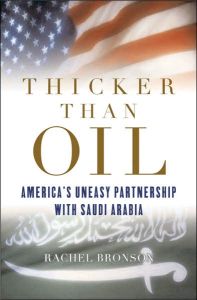Join getAbstract to access the summary!

Join getAbstract to access the summary!
Rachel Bronson
Thicker than Oil
America's Uneasy Partnership with Saudi Arabia
Oxford UP, 2006
What's inside?
Saudi Arabia is a crucial ally whose history and future – for better or worse – is intertwined with America's.
Recommendation
American foreign policy exists simultaneously at several levels. Talk radio and TV pundits occupy the surface level, while foreign policy professionals understand increasingly deeper layers of information, history and interpretation. Rachel Bronson uses a scholarly approach for this in-depth discussion of America's complex relationship with Saudi Arabia. Linked by their animosity toward communism, and a fundamental supplier-customer relationship based on oil, the Saudis and Americans were allies throughout the Cold War. Then, they worked clandestinely to thwart the Soviets. But in the post-Cold War environment, conditions changed. The Saudis faced a major threat from other Islamic nations over their monarchy and their close relations with the U.S. Bronson densely packs her book with historical events in diplomatic, military, religious and cultural frameworks. Much of this material was classified and unavailable previously, so Bronson has fresh information. getAbstract considers this essential reading for anyone who wants a deeper understanding of the vital, evolving relationship between Saudi Arabia and the United States.
Summary
About the Author
Rachel Bronson, Ph.D., is a senior fellow and director of Middle East Studies at the Council on Foreign Relations.


















Comment on this summary